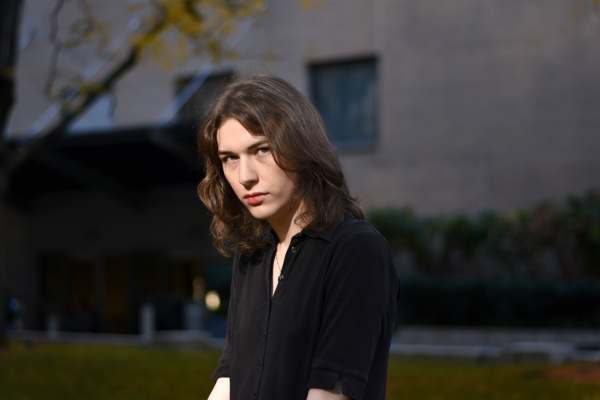College campuses across the U.S. have grappled with students’ responses to the war which ensued after the Oct. 7 attack on Israel by Hamas militants and the subsequent siege and bombardment of the densely populated Gaza strip by Israel’s military. In response, leaders of Fordham’s undergraduate Students for Justice in Palestine (SJP) organized an information session open to university community members on Oct. 26.
The discourse surrounding the Israel-Hamas war has become more contentious across different campuses, with many universities fearful of conflicts between different student groups in support of Israel and Palestine. Protests have sprung up at campuses across New York City, including Hunter College, Brooklyn College, Columbia University and New York University. The scale and frequency of demonstrations in response to the violence has led many universities to be fearful of violence targeting community members.
According to a spokesperson from SJP, they sought to strike an “educational” tone by holding an information session. On the eve of the first incursion of Israeli ground forces into Gaza, SJP asked students to come with “questions and a willingness to learn” in a flier posted on the group’s Instagram.
Students formed a circle and listened as a spokesperson for Fordham’s undergraduate SJP, Fordham College at Lincoln Center (FCLC) ’24, initiated the event by characterizing the conflict between Israelis and Palestinians as a political, rather than a religious, struggle.
“We don’t conflate Jewish identity with the Zionist movement,” the student said, referring to the political movement which advocates for the formation of a Jewish nation. “We believe that is bigoted.”
The student requested to remain anonymous for fear of retaliation and cited repercussions experienced by activists who stand in solidarity with Palestine. The anonymous student added that they are afraid they will be barred from visiting Jaffa, their family’s ancestral home in Palestine, if they are publicly identified as a pro-Palestinian activist.
Other pro-Palestinian student activists across the country have faced increased scrutiny in the wake of the attacks on Israel on Oct. 7 and the subsequent characterization of these attacks as “resistance” by the national SJP organization. A conservative organization called Accuracy in Media has sent “doxxing trucks” bearing the names of pro-Palestinian activists to college campuses including Columbia University and the University of Pennsylvania.
“I wish for a two-state solution. This can only be achieved in a world where the Palestinian government is willing to share the land with the Jews. This means that Hamas cannot exist.”David Wyle, FCLC ’27
At the event on Fordham’s campus, student attendees took turns sharing their perspectives on a variety of subjects from the rights of Palestinians inside of Gaza, the history of conflict in the region and their own relationships to their Palestinian or Jewish heritage.
Sam Gluck, FCLC ’26, who identifies as Jewish, drew a parallel between the historical displacement and killing of Jewish peoples and the present-day violence in Gaza.
“It is very antisemitic, in fact, to conflate all us Jews with this brutal violence,” Gluck said. “You hear Jewish people, when they talk about the Holocaust, they say ‘never again,’ but it’s happening again right now in Palestine.”
David Wyle, FCLC ’27, spoke in support of Israel and argued that Hamas poses a fundamental obstacle to coexistence in the region so long as the group remains in control of the Gaza Strip.
“We are here because Israel’s government is cutting off food and water and electricity to civilians and bombing them to force them from their land.”Samarali Kristeen, FCLC ’27
“I wish for a two-state solution,” Wyle said. “This can only be achieved in a world where the Palestinian government is willing to share the land with the Jews. This means that Hamas cannot exist.”
Wyle’s responses incited passionate reactions from other students at the information session. The spokesperson for SJP, however, stepped in to moderate the conversation and ensure that Wyle had the opportunity to respond.
The two sides struggled to find common ground as disagreements over the history of the decadeslong conflict between Israel and Palestine posed an impasse. Soon, everyone in attendance was standing, and passions escalated as the conversation moved to the present-day hostage situation in Gaza.
“You hear Jewish people, when they talk about the Holocaust, they say ‘never again,’ but it’s happening again right now in Palestine.”Sam Gluck, FCLC ’26
Samarali Kristeen, FCLC ’27, disagreed with Wyle and said that Israel’s goal of eliminating Hamas could not justify the human cost of war in the form of civilian casualties.
“Everyone here agrees that antisemitism is real. Everyone agrees that killing is never okay,” Kristeen said. “We are here because Israel’s government is cutting off food and water and electricity to civilians and bombing them to force them from their land.”
After the event, the SJP spokesperson said they were happy with how the information session went.
“It was the most engaged I have ever seen my club,” they said. “Usually, it’s just a head nodding session. It’s good to have some diversity.”
Wyle seconded that the conversation was well-mediated and allowed for people of differing opinions to voice their viewpoints. He commended the spokesperson for SJP, who acted as the moderator, for not dismissing his opinions, engaging with his ideas in “good faith” and for “being very civil and allowing me a chance to speak.”
The undergraduate SJP remains unofficially recognized by Fordham’s administration after Keith Eldredge, assistant vice president and dean of student services, decided in 2017 — when he served as dean of students at Lincoln Center — to permanently ban the group, arguing that if officially sanctioned SJP would “present a barrier to open dialogue.” The ensuing six-year legal battle concluded after the New York State Supreme Court overturned an earlier ruling that mandated Fordham’s recognition of the club.
At the information session, the spokesperson for SJP signaled hope that Fordham would reverse the decision this semester.
Bob Howe, assistant vice president for communications and special advisor to the president, declined to comment.

